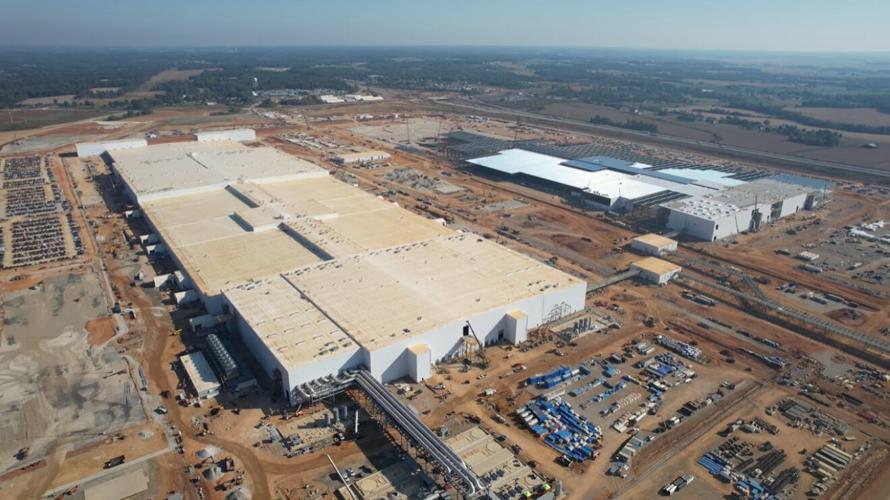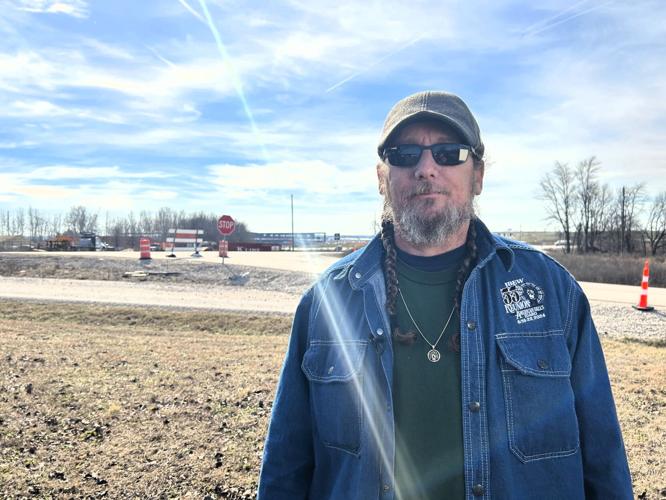GLENDALE, Ky. (WDRB) -- Construction workers building a $6 billion pair of battery plants in Kentucky to supply Ford Motor Co.'s electric vehicles are being exposed to significant levels of mold on the job, according to a private environmental analysis obtained by WDRB News and interviews with workers.
Electricians and other tradespeople on the BlueOval SK site in Glendale said some workers have gotten sick with respiratory issues and headaches and that the contractors managing the project haven't sufficiently addressed the problem.
"It's really taken an effect on hundreds of workers from all trades," said James Dugan, an electrician who said he worked on the job for a subcontractor for about two months until he was laid off Friday.
However, Mike Gies, executive vice president for Louisville-based Abel Construction, a contractor working on the BlueOval project, said the company has taken action in response to employees' concerns and that three experts hired by Abel to evaluate the issue concluded the mold is "not hazardous" and not significant enough to stop work at the site.
As added precaution, a mold remediation company will be on site "in the near future" and posted at every entrance to the battery plant, Gies said.
"I have went above and beyond tenfold to ensure the employees' safety," he said.
A Kentucky environmental contractor found mold in the air and on the wooden crates containing equipment shipped from Korea to the BlueOval site, sometimes in "heavy" concentrations, according to a report dated Dec. 14, 2023, a copy of which was obtained by WDRB News.
The environmental contractor recommended a "mold protocol" be put in place "as soon as possible" to "protect workers," the report says.
Asked about the mold issue, a spokeswoman for BlueOval SK said only that the company is aware of an Occupational Health and Safety Administration investigation at the site. OSHA is the government agency that ensures workplace safety.
"Also, please keep in mind construction workers on the site are not BlueOval SK employees," BlueOval's Mallory Cooke said in an email, declining further comment.
BlueOval SK, a joint venture between Ford and its Korean technology partner SK On, is building two battery factories at the Kentucky site and a third in Stanton, Tennessee, to meet the automaker's ambition to be a leader in electric vehicle production.
The biggest economic development project in Kentucky history is likely also the busiest construction site in the state, with many union tradespeople working 10 or 12 hours a day, six to seven days per week with daily incentives worth up to $200 a day in addition to their wages and overtime.

James Dugan, an electrician, recently worked for a subcontractor on the BlueOval SK project in Glendale, Kentucky. Feb. 1, 2024. (WDRB Photo)
Like Dugan, a traveling electrician, many of the tradespeople are only in Kentucky temporarily for the BlueOval job.
BlueOval SK declined to say which construction contractors are responsible for the mold issues.
The project's main contractors — Southfield, Michigan,-based Barton Marlow and Kentucky-based Gray Construction — weren't available for comment. A spokesperson for Gray referred comment to Barton Marlow, which didn't respond.
The Kentucky Labor Cabinet, which handles OSHA matters in the state, withheld all records sought by WDRB News related to a recent workplace safety complaint regarding BlueOval SK, saying it can't compromise an ongoing investigation. A spokeswoman for the cabinet did not respond to a request for comment.
While not always harmful, exposure to mold can "lead to symptoms such as stuffy nose, wheezing, and red or itchy eyes, or skin" or even "severe reactions" such as fever or shortness of breath, according to the U.S. Centers for Disease Control and Prevention.
In addition to Dugan, WDRB News spoke to four electricians working on the BlueOval site. The others asked for anonymity to protect their employment.
Workers said the mold is primarily on wooden crates that contain factory equipment shipped to the BlueOval site, and in shipping containers housing those crates.
That is supported by a 46-page "Limited Mold Sample Analysis and Report" of the BlueOval site performed by Environmental Testing & Consulting of Kentucky.
The report was commissioned by Abel Construction, which is responsible for installing the tooling equipment for the factory shipped from overseas, Gies said.
The Dec. 14, 2023 report found mold in various concentrations on all nine samples taken.
Gies said the report represents the opinion of one three experts hired to evaluate the problem, which Abel acted upon "within hours" of learning of it. None of the experts said the environment was unsafe for work, he said.
The report describes one wood crate examined in which a high concentration of mold was found in the air inside the crate.
"This may help explain why workers and safety officers around the plant are expressing their concerns about the heavy mold odor coming from these wood crates while being opened," the report says.
The environmental firm also examined an empty shipping container. When the container was opened, "The mold smell was very heavy to the point that there is a clear sign the wood crates being shipped in these containers were experiencing high levels of moisture inside these wood crates prior to leaving the shipping ports in Korea."
Two other empty containers had "the same odor of the same intensity," according to the report.
"It's like if you walked into a crypt or something — just horrible," Dugan said of the smell. "It will knock you down when you open the crates or containers or even walk in the door on some floors."
Gies, reading from a message that was shared with employees on the BlueOval site, said the mold is "not hazardous though it may cause slight irritation to the throat and eyes if employees have preexisting medical conditions or a sensitivity to these types of substances."
In addition to the mold remediation company that is soon arriving at the site, Gies said other protocols have been established. About 90% of the wooden crates are being broken down in a separate clean room and the wood is being removed and sprayed with a bleach solution. Employees have been advised to procure masks and rubber gloves if the mold may irritate them. Finally, anything that looks like mold on the equipment itself has instead been determined to be corrosion, he said.
Gies declined to identify the other environmental experts Abel consulted.
The BlueOval project is a lynchpin in Ford's EV strategy.
Citing uncertainty demand for electric vehicles, Ford has indefinitely delayed the start of production at one of the two Kentucky plants. But at the first plant, workers are busy trying to keep the facility on schedule to produce batteries next year.
The battery plants are supported by a $9.2 billion low-interest loan from the U.S. Department of Energy and a $250 million subsidy from Kentucky taxpayers.
Kentucky Business News:














